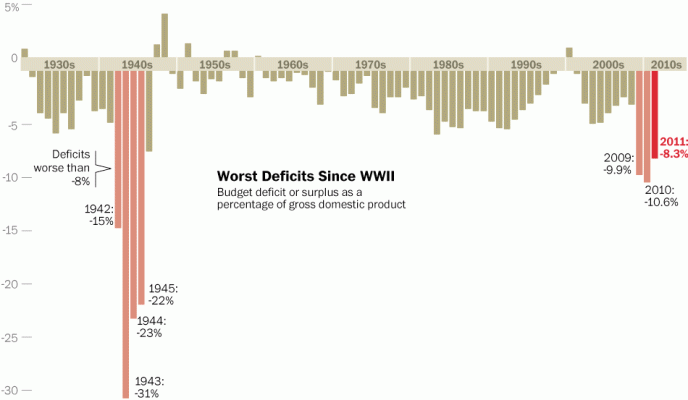That's actually a more complicated question than it looks like.
A large portion of the deficit is due to safety net spending that increased dramatically because of the recession (unemployment, Medicaid, food stamps, etc), as well as a collapse of tax revenues caused by the recession. Another large portion comes from temporary measures designed to help during the recession (extended unemployment, SS tax cut, etc).
So if the economy improves, a large chunk of the deficit will go away as well. The article puts the deficit number at $1.3 trillion (2011), but 2012's deficit was only $1.1 trillion. Every month we are generating about 150k net new jobs. If that continues, that means that by this time next year, we'll have another 1.8 million people that will be paying into the system rather than taking out of it.
Once the economy gets to full employment, the best guesses I've seen put the expected deficit in the $500 billion range, but they are only guesses at this point. Since the economy grows over time, a modest deficit of $200 billion or so is not disasterous (although I think it would be better to aim for surpluses eventually). So our real structural problem in the medium term is probably only $300-$400 billion or so.
I suspect that a return to Clinton level taxes for everyone (not just the 250k+ crowd) would be enough to close that gap. I'm not advocating exactly that, but it's a good baseline to start with.
Some caveats--
We may go back into recession, especially if we don't smooth the fiscal cliff. The economy is still very fragile, and taking $500 billion out of it in a year may spiral us back into a severe recession.
We need to get medical spending under control. Medicare, Medicaid, and the VA are going to eat us alive in a few decades if we don't do something to bend the curve.
We need to get untangled from foreign wars and stay untangled for awhile.
Ok, I have a mainstream financial question for those who know more about national economics than I do.
Can the current level of spending be met with tax revenue? In other-words at what ever level of taxation is required to meet it.




